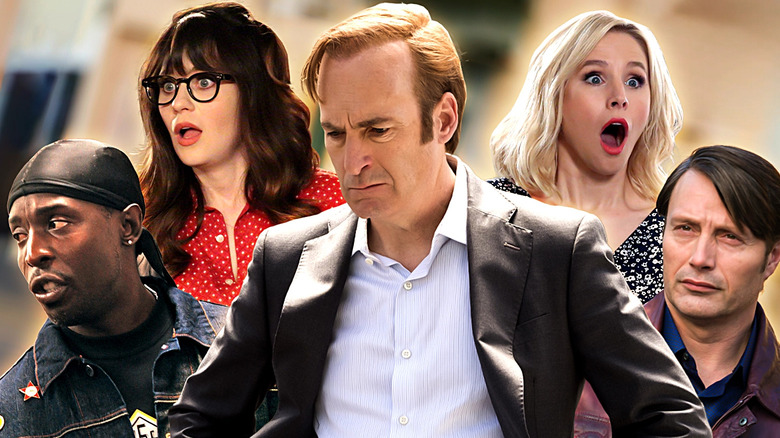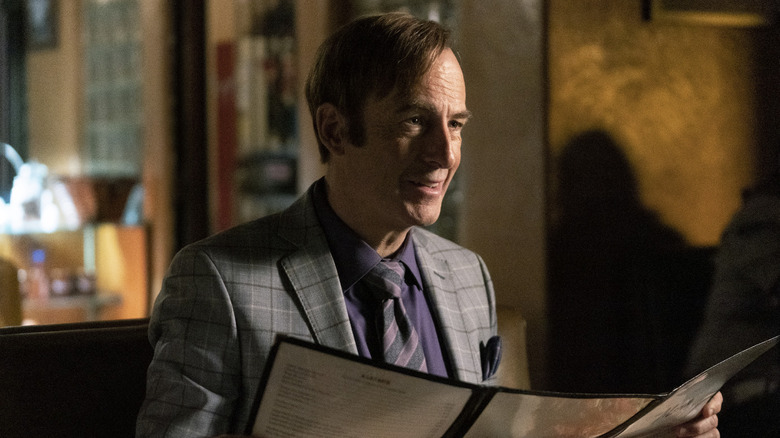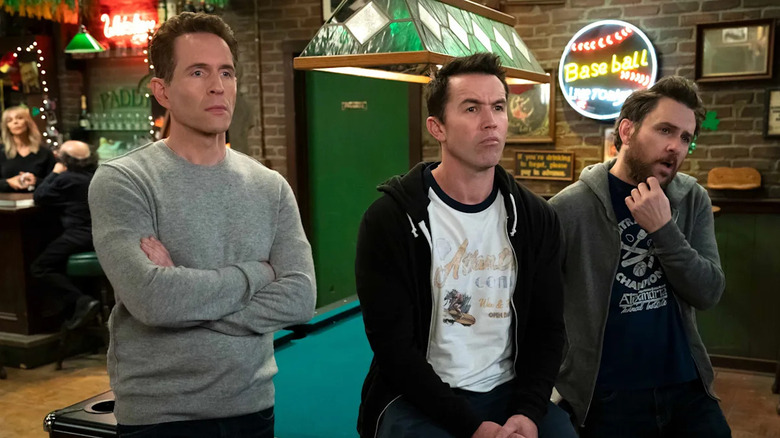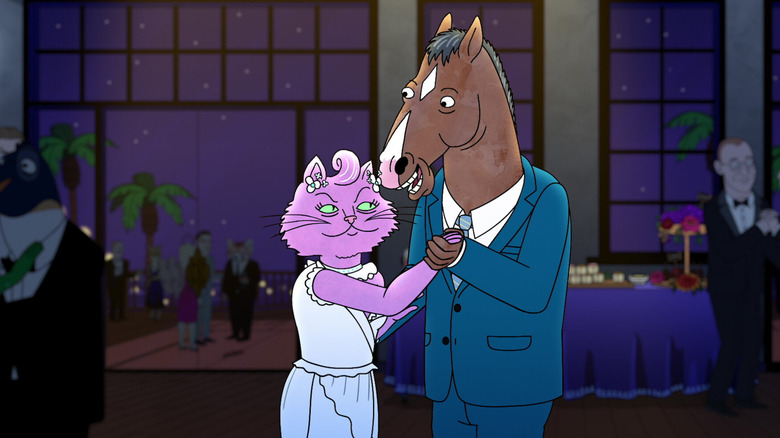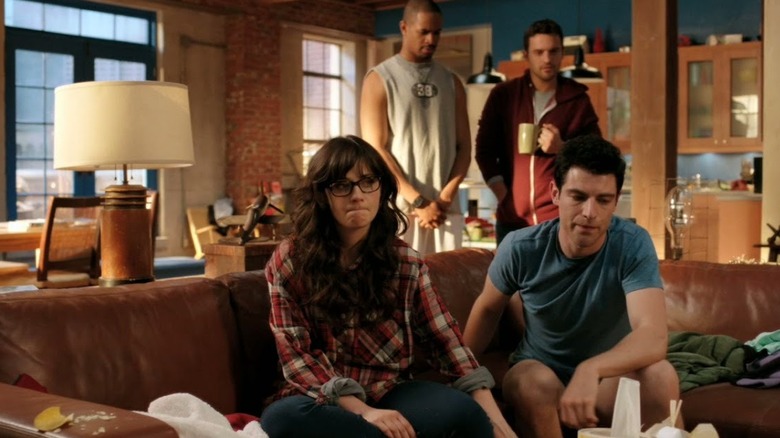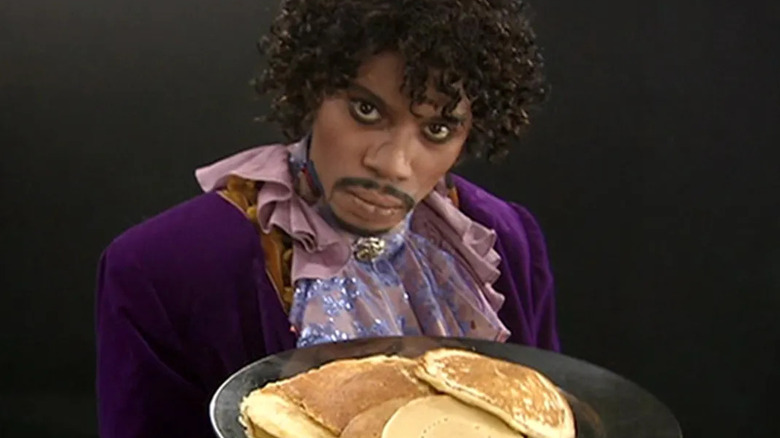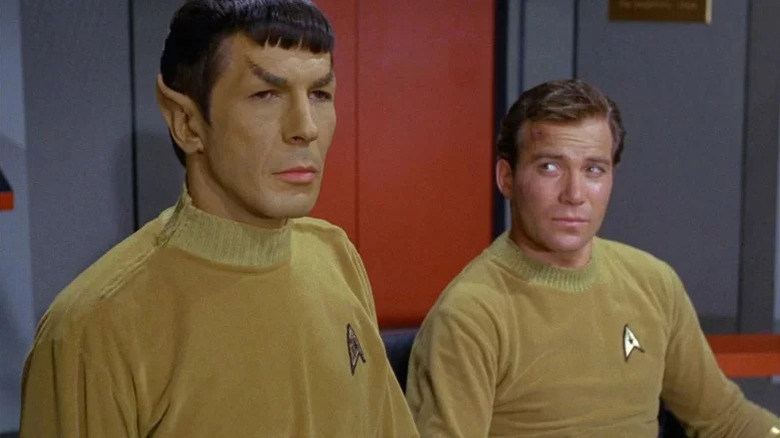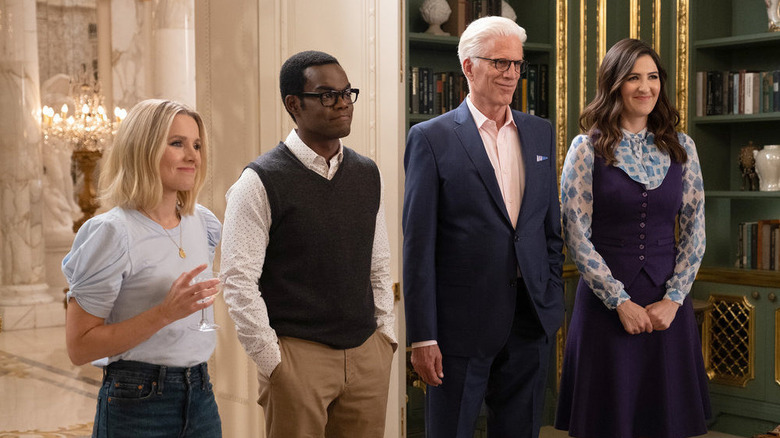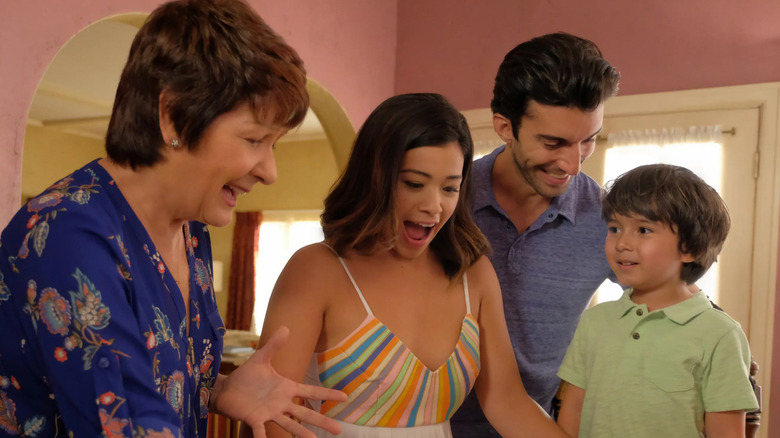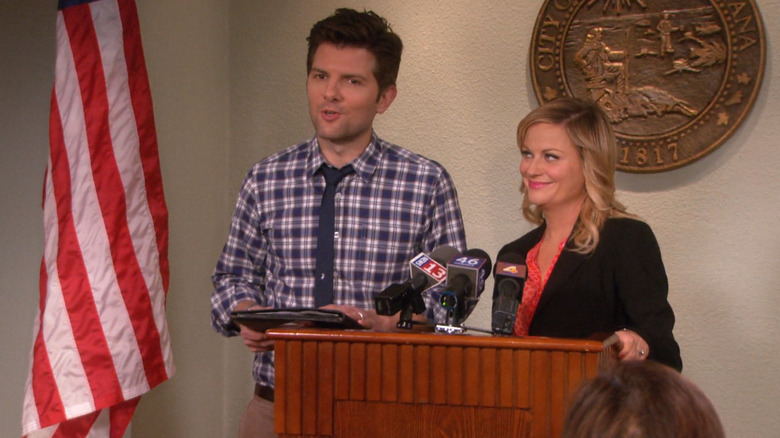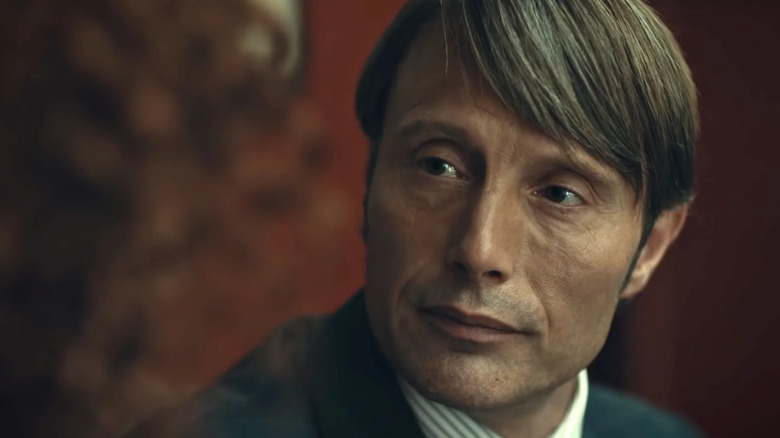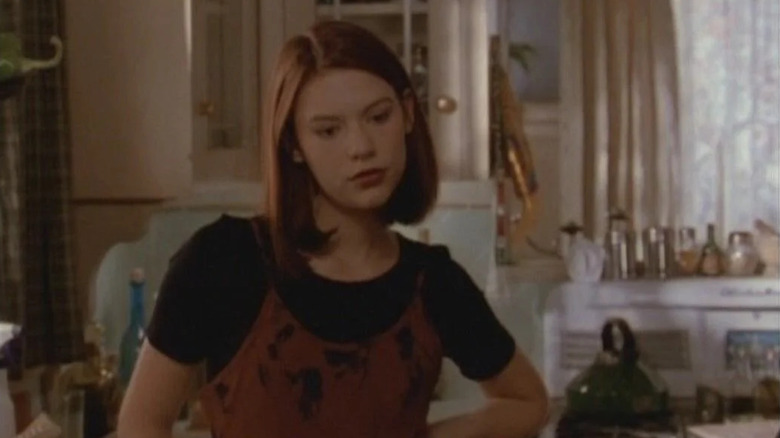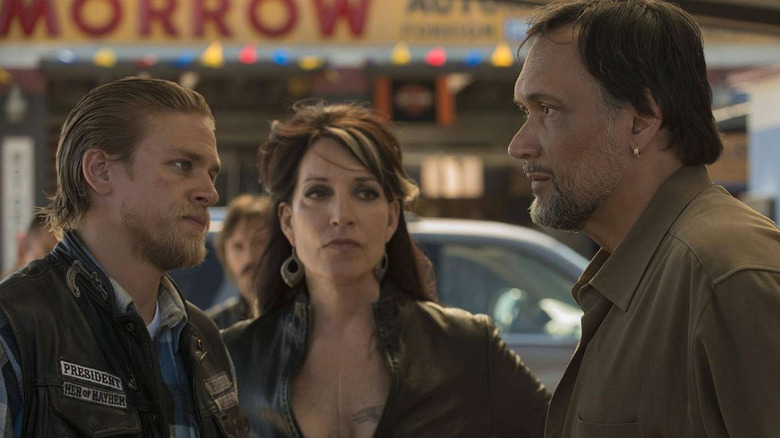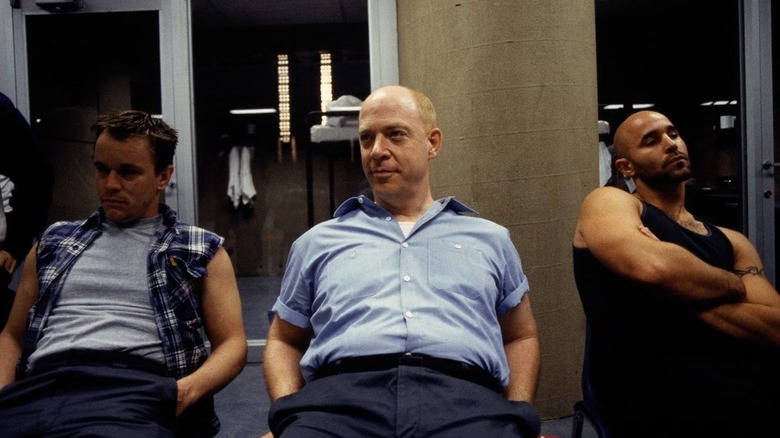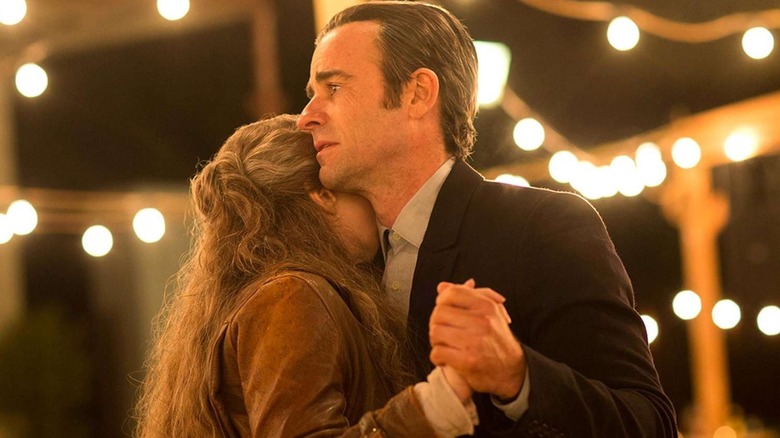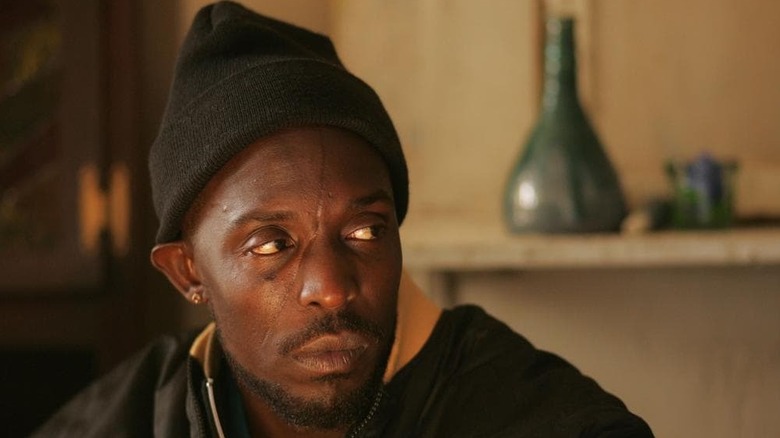The 15 Best TV Shows That Never Won An Emmy
The Emmys, when compared with the Oscars and Golden Globes, are the most predictable of the screen media awards. If you watch the Emmys long enough, you become familiar with the Television Academy's game.
It's as simple as this: They choose a handful of shows they like, and make them sweep their genre categories, sometimes multiple years in a row. Notable examples of this phenomenon include "Game of Thrones," "Succession," and "The Bear." How many times did "RuPaul's Drag Race" win Outstanding Reality Competition Program despite middling seasons? If a show was good once, the Academy will lazily default to awarding the show consistently instead of critically assessing the quality of individual seasons. This leaves many of our favorite shows shut out of the Emmy winners' circle, often a case of bad timing during another show's reign atop the same genre.
On this list, we'll celebrate the shows that came up just short of Emmy gold, for one reason or another. Here are the 15 best shows that never won an Emmy.
Better Call Saul
The most glaring example of a zero-Emmy show is "Better Call Saul." Here is the show's Emmy record: 53 nominations, zero wins. Zero!! How spiteful can you be, Television Academy?!
Despite the Academy's seemingly personal vendetta against the show, "Better Call Saul" is considered generally to be a stellar prequel to "Breaking Bad." Bob Odenkirk provided such depth to the character of Saul Goodman, masterfully mirroring the moral deterioration that Bryan Cranston did with Walter White. He had the unique task of essentially acting backwards, first playing Saul Goodman in his final form in "Breaking Bad" and then acting with more humility as public defender, Jimmy McGill. Odenkirk transformed Jimmy back into Saul, from disgruntled lawyer, to serious con man, to high-rolling consigliere to White's drug empire. In five nominations for Outstanding Lead Actor — that's one for every season — the Television Academy could have coughed up one win for his work.
If not that, "Better Call Saul" certainly deserved awards for the writing or cinematography. Creators Peter Gould and Vince Gilligan managed to create a cohesive timeline from "Better Call Saul" to "Breaking Bad" while maintaining consistency in voice and theme. Quality be damned, the Emmys just couldn't pull the trigger on a win.
It's Always Sunny in Philadelphia
A TV show about a rowdy bunch of drunks shouldn't work — not as a scripted series, at least. But the hilarious cast of "It's Always Sunny in Philadelphia" made it work, and they still are 20 years later. A show about a Philly bar managed by a group of perpetually-wasted, inept, and scheming people known as "the gang," it isn't hard to understand the longevity after watching an episode or two. Viewers are fully bought into each character's quirks, and the actors have been portraying the characters for so long that they practically feel like real people. The characters are outrageous, yes, but the actors commit so hard to their dialogue that you forget you're watching fictional people.
That level of commitment is Emmy-worthy, which makes it baffling that the series or actors haven't snagged at least one win in 20 years. It's not too late for the Television Academy to give "Always Sunny" a statue, as the 17th season just premiered in July 2025. Maybe they'll finally hand one over for the show's final season, as they often do for beloved programs' final episodes.
BoJack Horseman
"BoJack Horseman" not only legitimized Netflix in terms of adult animation, but it changed the animation game entirely. Indeed, the series took advantage of the medium by exploring comedy and tragedy in the most absurdly hilarious ways. Tackling subjects like abortion, racism, sexism, addiction, and sexuality among others, few subjects were off-limits to the unhinged characters of the "BoJack" universe. What made the show special was that it approached serious topics with grace or candor, and had intelligent writing that knew which tone to use when. Above all, it never forgot to be funny, which is what viewers loved most about it.
The voice acting was another strong aspect of the series, especially from lead Will Arnett as BoJack. However, as is typical with Hollywood, animation remains an afterthought. The Television Academy likely could not bring themselves to award an animated show over a live-action one. Maybe the show was too edgy for the Emmys, anyway.
New Girl
"New Girl" ruled the 2010s and was the poster child for the quirky brunette era of white female leads. This was the era of terms like "adorkable" being used unironically. It's the role Zooey Deschanel is best known for outside of "(500) Days of Summer," even if she caught some flak for playing basically the same character in every movie she was cast in afterward. Still, the show's popularity during its run makes it a shocking loser at the Emmys.
Put simply, "New Girl" was a delightful watch. Each character interacted well with Deschanel's acting as Jess Day, and the way dynamics between characters evolved was interesting without being messy. Deschanel's comedic performance was the guiding light for the series, serving as a likable mix of innocent and bawdy female lead (a girl's girl and a guy's girl, if you will). It's a shame that it never scored an Emmy, but the absence of that specific accolade hardly ruins its legacy.
Chappelle's Show
Many of us mourn for the days of yore with Dave Chappelle, before he was sparking outrage in his comedy specials for his baseless targeting of trans people. We should never forgive him for what he took from us, which was some of the most important comedy of the 21st century.
"Chappelle's Show" is broadly viewed as one of the best sketch comedy shows of all time, but strangely, it never won an Emmy during its run. The show's brilliance was its approach to social commentary during an era where many Americans were becoming disillusioned with the American Dream. Through satire, Chappelle explored race relations, stereotypes, and celebrity culture via satirical, over-the-top sketches. Put simply, he was going for it in ways that other comics weren't at the time, in terms of actual punchlines and physical comedy.
Even if many of the sketches don't hold up by today's standards, the public's fondness for "Chappelle's Show" mostly stems from the giddy way we felt when we watched it. Yet, in the mid-2000s, the Television Academy didn't seem to be ready to take Black comics like Chappelle seriously.
Star Trek: The Original Series
Although it's a shame that "Star Trek: The Original Series" never won an Emmy, you could perhaps understand why. It was a show about space exploration during the 1960s. During the series' run, the Emmy Award was less than 20 years old. It makes sense that mid-century Academy members wouldn't see the merit in such a fantastical premise, let alone the acting within it. They likely felt awarding such a show would threaten the legitimacy of the award they were trying to establish. Their loss!
There's a solid argument that "The Original Series" is the best "Star Trek" show. It features the most well-known crew with actors William Shatner, Leonard Nimoy, George Takei, and Nichelle Nichols who all brought signature flair to their roles. The inclusion of Nichols and Takei specifically was groundbreaking, as they had serious roles that avoided racial stereotypes still common at the time.
The Academy might not have fancied the universe of "Star Trek," but anyone who gives the show a chance would agree the world-building and writing was complex, logical, and dramatic. It also found a way to weave in socially relevant discourse into the plot with subtlety, which was a unique feat for the civil rights era.
The Good Place
On the one hand, you could think that "The Good Place" was a prime candidate for an Emmy award. Generally wholesome and pleasant to watch, existential, philosophical. You know, all the things awards bodies typically praise in media. On the other, these things could have repelled the Academy as being too run-of-the-mill. Regardless, "The Good Place" was a reliable network sitcom in the latter half of the 2010s. It managed to write in captivating twists that expanded the rules of their universe in every fantastic season and navigated them to a satisfying, happy ending. The cast was also diverse and meshed well in scenes of conflict and compassion.
The standout was Kristen Bell, who managed to create another signature role for herself outside of "Veronica Mars" and "Heroes" a decade prior. The performance of D'Arcy Carden as Janet is one that definitely could have been awarded too, as she had the more challenging task of acting out a robot-like being that eventually develops a human personality. Oh well, a lack of Emmys hasn't changed fans' enduring love for the series.
Jane the Virgin
A telenovela, family sitcom, and romcom all rolled up into one, "Jane the Virgin" was one of the best shows in The CW's history. Yet, it never won an Emmy. The premise of accidental insemination — a common trope in telenovelas — may have seemed flimsy to American audiences, but the writing helped viewers buy in quickly.
Gina Rodriguez as the titular Jane Villanueva carried the show, but this fact isn't a knock on her co-stars, who certainly held their own. It is more a testament to how amazing the actress was as Jane. Though not an Emmy, the Golden Globe she received for the role was definitely earned. She brought such range to Jane, making her believably naïve, idealistic, clumsy, and empathetic. She really shined in moments that called for dramatic acting or sadness. Young Jane as well, played by then-child actress Jenna Ortega, brought the appropriate amount of innocence when on screen.
As a whole, "Jane the Virgin" was a feel-good watch. You could laugh, cry, and think deeply about the meaning of family and parenthood. The telenovela writing style was the most consistent aspect of the show, and despite the writing team's attempts to meld it with American storytelling styles, it was likely still too wacky for the Academy.
Parks and Recreation
For as iconic as "Park and Recreation" has become in pop culture, it's easy to passively believe that it was a multi-time Emmy winner by the end of its run. Somehow, Leslie Knope (Amy Poehler) and crew never won an Emmy.
"Parks and Rec" was a workplace comedy in the same vein as "The Office" but with a satirical political twist. Premiering just a year after the end of her "Saturday Night Live" run, Poehler led the cast as the central star of the series, but the cast certainly weren't slouches. It was a foundational show in the careers of Aubrey Plaza, Chris Pratt, Billy Eichner, and Nick Offerman among others.
Before "Veep," "Parks and Rec" was the main political satire on primetime TV. It portrayed government organizations and their employees as strange and bumbling, but also depicted the stir-crazy kinship that working in an office creates among colleagues. The cast had excellent chemistry, and each of them brought charisma to their roles that made their characters distinct, whether it was the deadpan of Offerman's Ron Swanson or the youthful indifference of Plaza's April Ludgate.
Given the fantastic performances, the show was critically praised. Perhaps the Television Academy thought it was a little too much like "The Office" to award it, a fair assessment given that "Parks and Rec" was almost an "Office" spin-off.
Hannibal
You'd think portraying one of the most critically acclaimed villains of all-time would be an express ticket to the Emmy stage. But alas, the TV adaptation of the cannibal Hannibal Lecter never got there.
The short-lived "Hannibal" burned fast and bright, with critical praise for its acting and brooding aesthetic. Mads Mikkelsen was an excellent choice to play Lecter, as he brought an elegant air to him that made his homicidal tendencies all the more unsettling to witness. The series was also a terrifying twist on the procedural drama, with the titular character acting as a saboteur to the FBI investigation of his own crimes.
"Hannibal" wasn't a straightforward horror project but a thriller as well. The latter is typically something awards bodies love to throw accolades at, but I suspect the horror aspect of the show is what kept Emmy awards just out of reach. As a collective, Hollywood awarding bodies still don't know what to do with horror as a genre; it is rarely recognized as a serious artistic niche. Instead, it is up to audiences and less mainstream awarding bodies to pick up the slack, assigning prestige to the best horror projects of our time. Such was the fate of this cult favorite series.
My So-Called Life
The exclusion of "My So-Called Life" from the Emmy winners circle is shocking — but only in hindsight. The series only ran for 19 episodes, being abruptly cancelled after only five months on air in early 1995. Starring Claire Danes and Jared Leto in their breakout roles, "My So-Called Life" hit hard topics in its short run, addressing sexual assault, substance abuse, and school violence along with everyday teen melodrama.
It was far from an underrated teen drama, as it earned praise from critics for its realistic portrayal of teen life. Yet, with less than 20 episodes to its name, the show couldn't gather enough steam for an Emmy win. It was the '90s equivalent of getting into a really good Netflix series only to find out it was cancelled after one season. The legacy of the show lives on as a cult classic, and is generally considered one of the best teen dramas of all time.
Sons of Anarchy
"Sons of Anarchy" gave audiences yet another variant of the mob/crime drama, but this time with a twist: biker gang warfare. The series was beloved by viewers for its more rugged, vigilante approach to justice compared to more organized crime dramas like "The Sopranos." No suits, just leather. The real heartbeat of the show, however, was Jax Teller (Charlie Hunnam) and the brotherhood of his gang, the Sons of Anarchy. The show tells a satisfying story of Jax becoming a man, navigating the lawless world he belongs to, managing betrayals, and honoring his father's legacy as club leader.
The series received positive reviews for its seven-year run, never really having a "bad" season, at least according to critics. However, the Television Academy never gave the series a gold statue. They weren't the only ones to pass on the show, either – HBO passed on "Sons of Anarchy" as well, leading to the show's eventual pickup by FX. Perhaps that was for the better (at least for FX), since the biker drama was the network's first entry into critically acclaimed dramas, a tradition continued with shows like "Pose," "The Bear," and "Shogun."
Oz
Before "Orange is the New Black," there was "Oz."
Even before "The Sopranos" was the face of prestige television on HBO, "Oz" was earning praise from critics and audiences alike for its gritty portrayal of prison life. The series was one of the first major roles in Hollywood legend J.K. Simmons' career as the brutal prison gang leader, Vernon Schillinger. The series also featured another legend, Rita Moreno, as a series regular. "Oz" was in many ways an extreme look at racial and social dynamics in the U.S. at the turn of the century, displaying shocking acts of violence between rivaling factions that kept viewers on the edges of their seats.
Outside of its obvious influence on other prison shows like "Orange is the New Black," the gruesome series also inspired the action of Netflix's "Cobra Kai." "Oz's" influence has been far-reaching, but despite this, the show never won an Emmy.
The Leftovers
Unfortunately true to its name, "The Leftovers" was always left behind when it came to Emmy wins. Like many others on this list, the series was overshadowed by the Television Academy's favorites during its run, playing stepchild to shows like "Orange is the New Black," "House of Cards," and juggernaut "Game of Thrones." Nevertheless, "The Leftovers" was yet another entry into HBO's prestige collection, earning critical acclaim throughout its 28-episode run. It was praised for the way it depicted grief, spirituality, and the lengths people go to fill the voids within themselves (yes, that included cults).
HBO even took a calculated risk with the series, breaking a decades-long rule of keeping productions in-house. If the series itself couldn't earn an Emmy, it's shocking that it couldn't at least earn acting wins for Justin Theroux and Carrie Coon, whose performances anchored the series. Even still, fans still talk about the series as brilliant and powerful close to a decade after the series finale.
The Wire
"The Wire" is right at the top of the list of egregious Emmy omissions. It sits comfortably as the 1B HBO prestige drama of the early 2000s, right under "The Sopranos" as 1A. You could think of it as "The Sopranos'" even edgier sibling. It was a gritty portrayal of the drug trade, the corruption of government officials and structures, systemic oppression, and the tense intersections of them all. "The Wire" gave us Idris Elba and Michael K. Williams, who would go on to have successful careers because of their realistic portrayals of Stringer Bell and Omar Little, respectively.
What is there to say about this series that hasn't already been said? Its critiques of capitalism and surveillance of Black communities trying to survive is award-worthy. The performances, featuring many people actually from Baltimore in semi-fictional roles, felt more authentic than anything on TV at the time. Let's just call a spade a spade — the Television Academy simply wasn't awarding shows with majority Black casts in the 2000s, and certainly not ones receiving average ratings from critics. Even if it didn't get its flowers at the time, "The Wire's" legend grew, and the series is still being celebrated more than 20 years after the first episode as one of the greatest TV shows of all time.
